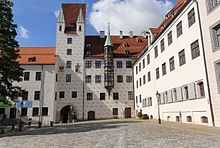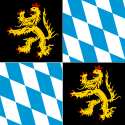Bavaria-Munich
| Bavaria-Munich | |||||
| Teilherzogtum Bayern-München | |||||
| State of the Holy Roman Empire | |||||
| |||||
|
| |||||
| Capital | Munich | ||||
| Government | Monarchy | ||||
| Duke of Bavaria-Munich | |||||
| - | 1392-1397 | Johann II, Stephen III, and Friedrich | |||
| - | 1397-1438 | Ernest and William III (until 1435) | |||
| - | 1438-1460 | Albert III | |||
| - | 1460-1463 | John IV and Sigismund | |||
| - | 1463-1465 | Sigismund | |||
| - | 1465-1508 | Sigismund (until 1467) and Albert IV | |||
| Historical era | Middle Ages | ||||
| - | Bavaria-Munich and Bavaria-Ingolstadt split off from Bavaria-Landshut | 1392 1392 | |||
| - | Bavaria-Munich, Bavaria-Ingolstadt, and Bavaria-Landshut divide Bavaria-Straubing | 1425 | |||
| - | Bavaria-Dachau separates from Bavaria-Munich | September 3, 1467 | |||
| - | Bavaria-Dachau returns to Bavaria-Munich | February 1, 1501 | |||
| - | Reunification of the Duchy of Bavaria | July 30, 1505 1505 | |||
Bavaria-Munich (German: Bayern-München) was a duchy which was part of the Holy Roman Empire from 1392 to 1505.
History
After the death of Stephen II in 1375, his sons Stephen III, Frederick, and John II jointly ruled Bavaria-Landshut. After seventeen years, the brothers decided to formally divide their inheritance. John received Bavaria-Munich, Stephen received Bavaria-Ingolstadt, while Frederick kept what remained of Bavaria-Landshut. In 1429 portions of Bavaria-Straubing including the city of Straubing were united with Bavaria-Munich. The duchy existed for a little more than a hundred years before Bavaria was reunited under Albert IV, Duke of Bavaria.

Bavaria-Munich (green) with Bavaria-Landshut (orange), Bavaria-Ingolstadt (brown) y Bavaria-Straubing (grey).

The Old Court in Munich
